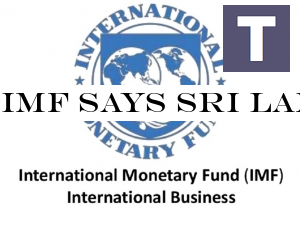
Sri Lanka's economy remains vulnerable to adverse shocks and the economy is expected to recover gradually in 2019, while downside risks remain, the International Monetary Fund said in its staff report released Thursday following the Fifth Review under the Extended Fund Facility.
Real GDP growth is projected to recover to 3.6 percent in 2019 compared to 4.5 percent at the time of the fourth review in June 2018, driven by agriculture and manufacturing, and to gradually reach 5 percent over the medium term.
"Nevertheless, important downside risks remain, stemming from a tightening of global financial conditions and weaker external demand, as well as domestic uncertainty after the recent terrorist attacks and in the run up to the elections," the report said.
Inflation is expected to rise to 4.5 percent by end-2019, as economic activity recovers and food prices stabilize, following weather-related supply disruptions in 2018.
The current account deficit is projected to narrow to 2.8 percent of GDP in 2019, driven by export growth, supported by the exchange rate correction and recently-signed free trade agreements, and lower oil prices.
The IMF report said Sri Lanka's economy remains vulnerable to adverse shocks given the high public debt, large refinancing needs, and low reserves.
According to the global lender, a tightening in global financial conditions and capital flow pressures could raise refinancing risks.
Trade tensions in key economies, coupled with weaker global growth, could reduce export growth, FDI, and remittances.
"On the domestic front, political uncertainty in the run up to the elections poses risks to program implementation, while security concerns following the terrorist attacks might negatively affect tourism and investor sentiment.
On the upside, stronger external demand and FDI, an easing of trade tensions and global financial conditions could support growth and facilitate the adjustment."
Lower energy prices would reduce the current account deficit and support the implementation of energy pricing reforms.
The IMF staff recommended that prudent monetary policy by the Central Bank of Sri Lanka should continue, together with greater exchange rate flexibility, consistent with the roadmap towards flexible inflation targeting.
The lender noted that renewed efforts to improve transparency, accountability, and cost-efficiency of large state-owned enterprises are needed.
While the implementation of the fuel pricing reform has been a major step to mitigate fiscal risks from Ceylon Petroleum Corporation, the authorities should move forward with plans to bring SriLankan Airlines on a sound commercial and financial footing and complete energy pricing reforms to address remaining risks from SOEs, the IMF staff recommended.
Sri Lanka has requested the IMF to extend the EFF arrangement by one year to allow for adequate time to complete the government's reform agenda, and accordingly, the EFF arrangement has been extended until June 2, 2020.

 6
6





